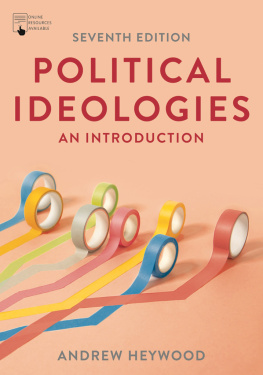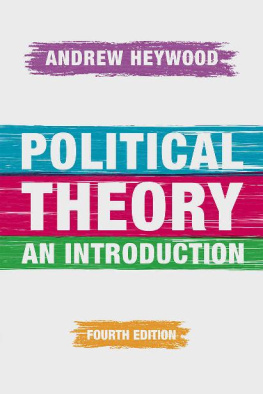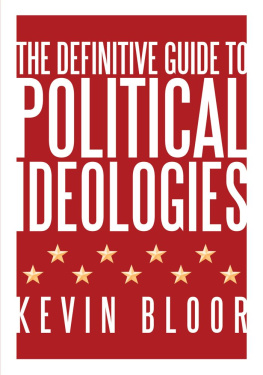Political Ideologies
An Introduction
sixth edition
SIXTH EDITION
POLITICAL
IDEOLOGIES
An Introduction
ANDREW HEYWOOD

Andrew Heywood 1992, 1998, 2003, 2007, 2012, 2017
All rights reserved. No reproduction, copy or transmission of this publication may be made without written permission.
No portion of this publication may be reproduced, copied or transmitted save with written permission or in accordance with the provisions of the Copyright, Designs and Patents Act 1988, or under the terms of any licence permitting limited copying issued by the Copyright Licensing Agency, Saffron House, 610 Kirby Street, London EC1N 8TS.
Any person who does any unauthorized act in relation to this publication may be liable to criminal prosecution and civil claims for damages.
The author has asserted his right to be identified as the author of this work in accordance with the Copyright, Designs and Patents Act 1988.
First edition 1992
Second edition 1998
Third edition 2003
Fourth edition 2007
Fifth edition 2012
Sixth edition 2017
Published by PALGRAVE
Palgrave in the UK is an imprint of Macmillan Publishers Limited, registered in England, company number 785998, of 4 Crinan Street, London, N1 9XW.
Palgrave and Macmillan are registered trademarks in the United States, the United Kingdom, Europe and other countries.
ISBN 9781137606020 hardback
ISBN 9781137606013 paperback
This book is printed on paper suitable for recycling and made from fully managed and sustained forest sources. Logging, pulping and manufacturing processes are expected to conform to the environmental regulations of the country of origin.
A catalogue record for this book is available from the British Library.
A catalog record for this book is available from the Library of Congress.
For Jean
Summary of Contents
Contents
Figures
Boxes
KEY FIGURES IN...
... Liberalism
... Conservatism
... Socialism
... Anarchism
... Nationalism
... Fascism
... Feminism
... Green Ideology
... Multiculturalism
... Islamism
... Endism
KEY CONCEPTS
PERSPECTIVES ON...
TENSIONS WITHIN...
POLITICAL IDEOLOGIES IN ACTION...
Preface to the sixth edition
The first edition of Political Ideologies was written against the backdrop of the Eastern European Revolutions of 198991. In retrospect, the collapse of communism was both a manifestation of and a catalyst for a series of profoundly significant, and in many ways interconnected, politico-historical developments. Among the most important of these were the growth of the global capitalist economy, the rise of ethnic nationalism and religious fundamentalism, the advent of postmodern or information societies, the emergence of a US-dominated unipolar world order, and the birth of global terrorism. In dizzying ways, history appeared to have speeded up. The certainties and similarities of old came to be doubted or, in some cases, were discarded altogether. These processes had major implications for political ideologies. Socialism was commonly declared to be dead; some proclaimed the final triumph of western liberalism while others pointed out that it was in crisis; nationalism was adapted in the light of the challenges posed by globalization and multiculturalism; and so forth.
This sixth edition has been thoroughly revised and updated in the light of key ideological developments in recent years. The most substantial change from the previous edition is the inclusion of a new chapter, on Islamism (.
, the term green ideology is now used in preference to ecologism. This is because green ideology is a broader (and probably more familiar) term, and that ecologism is perhaps better treated as part of a collection of themes that define the ideology, instead of as its very essence. Finally, new, full-page and illustrated Political ideologies in action features have been added to examine the relationship between aspects of ideological theory and political practice.
I would like to thank all those at Palgrave who contributed to the production of this book, particularly Stephen Wenham, my publisher, Chloe Osborne and Amy Wheeler, as well as the anonymous review-ers who commented at various points in its development. Discussions with friends and colleagues, notably Karen and Doug Woodward, Angela and David Maddison, Barbara and Chris Clarkson, and Christina Dacey, also helped to sharpen the ideas and arguments advanced here. The book is dedicated to my wife, Jean, without whose advice, encouragement and support none of the editions of this book would have seen the light of day.
Acknowledgements
The author and publishers would like to thank the following, who have kindly given permission for the use of pictorial copyright material (names in brackets indicate the subjects of photographs):
Press Association, pp. 38 (The US Constitution), 52 (Immanuel Kant, Thomas Jefferson), 53 (James Madison, John Stuart Mill), 78 (Thomas Hobbes, Edmund Burke, Friedrich von Hayek), 79 (Irving Kristol), 80 (Margaret Thatcher and Ronald Reagan), 125 (Karl Marx, Vladimir Ilich Lenin, Eduard Bernstein), 125 (Herbert Marcuse, Leon Trotsky), 149 (Spain during the Civil War), 152 (William Godwin, Pierre-Joseph Proudhon), 153 (Henry David Thoreau), 184 (Jean-Jacques Rousseau, Johann Gottfried Herder), 185 (Mohandas Gandhi), 186 (Independence for India and Pakistan), 206 (The March on Rome), 197 (Benito Mussolini, Adolf Hitler, Alfred Rosenberg), 226 (Legalizing Abortion), 236 (Simone de Beauvoir, Betty Friedan, Kate Millett, Mary Wollstonecraft), 237 (Germaine Greer, Andrea Dworkin), 265(Arne Naess, James Lovelock, Rudolf Bahro), 288 (The Canadian Multiculturalism Act), 292 (Isaiah Berlin, Edward Said), 303 (Irans Islamic Revolution), 317 (Ayatollah Khomeini, Abul Ala Maududi); Getty Images, pp. 52 (Jeremy Bentham), 85 (Robert Nozick), 104 (Chinas Cultural Revolution), 124 (Robert Owen), 185 (Charles Maurras, Frantz Fanon), 212 (H.S. Chamberlain), 237 (bell hooks), 317 (Yusuf al-Qaradawi, Abdullah Azzam), 262 (The Rio Earth Summit); Alamy, 52 (John Locke), 152 (Max Stirner), 153 (Mikhail Bakunin, Peter Kropotkin), 184 (Guiseppe Mazzini, Woodrow Wilson), 212 (Joseph Arthur Gobineau, Friedrich Nietzsche, Giovanni Gentile), 265 (Ernst Friedrich Schumacher), 292 (Charles Taylor); Library of Congress, pp. 52 (Adam Smith), 185 (Marcus Garvey); The Library of the London School of Economics and Political Science, pp. 85 (Michael Oakeshott), 125 (Richard Henry Tawney); 329 Nigel Stead (Anthony Giddens); The Peoples History Museum, p. 125 (Antonio Gramsci); Ludwig von Mises Institute, p. 152 (Josiah Warren), 153 (Murray Rothbard), 317 (Sayyid Qutb); Janet Biehl, p. 265 (Murray Bookchin); Peg Scorpinski, p. 265 (Carolyn Merchant); Bhikhu Parekh, p. 292; James Tully, p. 293; Jeremy Waldron, p. 293; Jon Trowbridge, p. 237 (Jean Bethke Elshtain); Will Kymlicka, p293; Harvard University, p. 53 (John Rawls); Jane Reed/Harvard University, p. 329 (Daniel Bell); Jon Chase/Harvard Staff Photographer, p. 329 (Samuel P. Huntington); Francis Fukuyama, p. 329.
Every effort has been made to contact all copyright holders, but if any have inadvertently been omitted the publishers will be pleased to make the necessary arrangement at the earliest opportunity.

Political Ideologies and Why They Matter
Next page














